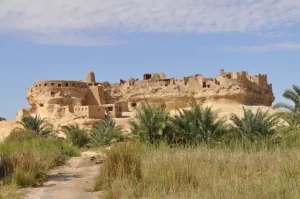Qara Oasis (Gara)
Qara Oasis, or Qarat Umm El-Sugheir, which means “Mother of the Little One”, is a picturesque village and one of Egypt’s inhabited oases. It lies at the point where the Egyptian desert tips down into the Qattara Depression. It is 16 km (10 miles) long and 8 km (5 miles) wide, 18,000 km² (6,950 square miles), and 133 meters (436 ft.) below sea level.
Unfortunately, the oasis is often disregarded due to its small size in comparison to other oases, with only around 360 people living there. In local folklore, if a newborn arrives, an elder will die shortly after, keeping the population constant. A mud brick village perched on a natural outcropping, it is one of the few remaining fortress towns to be found intact, untouched by modern convenience.
Qara can be considered the most isolated of the oases in Egypt. The other oases are affected by civilization to some extent but Gara stays as it is. It has its own Shali (historical fort) and natural springs. Few people make it to Gara, so the people living here are enthusiastic to meet visitors. Children are particularly excited, so you may wish to carry small gifts.
Qara is sometimes known as the camp of Alexander because, on his return journey from Siwa, Alexander paused here on the way to Memphis. The Sanusi were in Qara, as was the Axis army.
The original town of Qara was in reality a fortress, using the natural defense of the mountain, topped by the outer walls of the homes.
The people of Qara live in a very hostile environment and have a difficult time growing crops. They subsist on olives, and dates, which are the most important source of income, and a few vegetables. Beyond the oasis, dominating the horizon is the Mountain of the Milky Horns (Gebel Qarn Al-Laban), a white mountain with several outstanding peaks.
Despite its low economic status, Qara is one of the places in the Western Desert where traditional Bedouin hospitality is maintained. The village has a meeting hall where important matters related to the tribe are discussed. Here they also entertain guests who visit, with the Sheikh offering the traditional hospitality of tea on arrival followed by a tour of the oasis.


